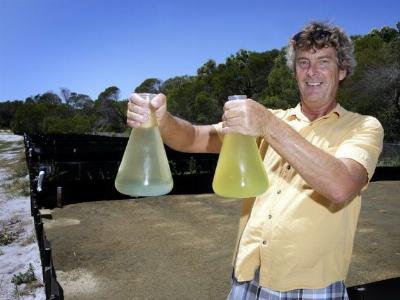Worms clear the way for prawn farming improvements

Dr. Paul Palmer - a senior Queensland Government biologist with the Department of Agriculture, Fisheries and Forestry - and the Bribie Island Research Centre have received a $245,000 grant to continue their five-year project on the use of marine worms to clean up the effluent from shrimp farms. Sand beds are stocked with a species of Moreton Bay sandworm, and the effluent from the shrimp ponds is flooded across the top of the beds. The worms consume the nutrients and algae that get trapped in the sand beds. The worms can also be harvested and used as a feed for shrimp broodstock.
A BRIBIE Island prawn farming project that uses marine worms as "vacuum cleaners" has been awarded $279,000 to help take the pollution-reducing concept to market.
Announcing the National Landcare Innovation Grant, Federal MP for Longman Wyatt Roy said the Bribie Island Research Centre was on the verge of international acclaim.
"The combination of ingenuity and practical value-adding involved in this research typifies not only Australian farming best-practice, but the Australian way," Mr Roy said.
"I congratulate the project leader Dr Paul Palmer and his team."
Mr Roy said Agriculture Minister Barnaby Joyce had approved 31 project applicants from across the nation under the $21.2 million innovation grants scheme.
"These grants are about developing smarter practices and technologies to assist primary producers to stay ahead of the game," he said.
"The goal is to reduce input costs and generate better returns while making sure our natural resources are here to support future generations."
Dr Palmer, a senior Queensland Government biologist with the department of Agriculture, Fisheries and Forestry, said his project had already undergone five years of trials at BIRC and local prawn farms.
Down-flow sand beds are built and stocked with a species of Moreton Bay sandworm.
Waste nutrients discharged by the prawns are bound in small algae and plankton which lodge in the sand and are consumed by the worms.
Dr Palmer said the innovation grant would fund a demonstration facility at Bribie Island Research Centre.
Related news
 Black tiger shrimp becoming the new lobster
Black tiger shrimp becoming the new lobster As black tiger shrimp becomes harder and harder to find, especially at sensible prices, there is talk of it becoming a high-end, niche product
 Nursery phase in shrimp farming, benefits beyond EMS
Nursery phase in shrimp farming, benefits beyond EMS An evolution in the design of nursery systems for longer duration, higher biomass and larger post larvae, and transfer techniques to maintain health
 Taiwan research team releases EMS detection test to public
Taiwan research team releases EMS detection test to public A polymerase chain reaction (PCR)-based method to detect early mortality syndrome (EMS) in shrimp has been developed by a Tainan, reports Rapid Micro Methods.